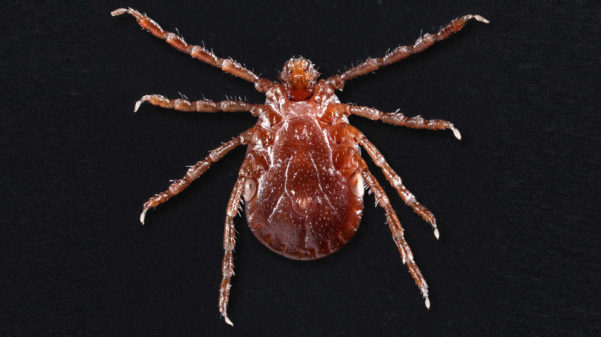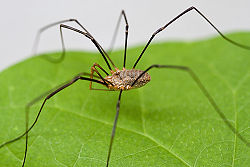READY TO GET STARTED?
REQUEST A FREE ESTIMATE
Fill out the form below or call (888) 466-7849 for a free, no-obligation estimate.

For the first time in fifty years, the U.S. has its first known invasive tick.
The longhorned tick, first discovered in November 2017, has been found in New York, Pennsylvania, Maryland, Virginia, West Virginia, North Carolina, and Arkansas. Professionals have had unsuccessful attempts to exterminate this particular species, leading it to be classified as an invasive species.
Normally an animal-attracted pest, the longhorned tick has been known to carry and transmit diseases like Lyme, spotted fever, and Severe Fever with Thrombocytopenia (SFTS). SFTS symptoms include fever, vomiting, multiple organ failure, along with many other symptoms. Fortunately, of the ticks tested here in the U.S., no human diseases have been detected.
As always, use the normal precautions towards tick exposure:
Continuing to follow these precautions will help to prevent tick exposure for you and your family members.
How Much Does a Termite Inspection Cost?
Pest Control for Basements and Attics
Wildlife Control: What Threat do Rodents Pose to Humans?
Exterminating: Rain and the Bugs it Brings?
Termite Treatment: Termites vs Flying Ants
Your home is probably the biggest investment that you will make in your lifetime. Not only is it a monetary investment but it’s a place where you want to feel safe, comfortable, and at peace when you are there. So what does termite control have to do with the value of your home?
Termites work 24/7 to find food. Unfortunately for us, and our homes, their choice of food is wood…as in the wood that is used to build our houses. So here we have these creatures that are eating wood around the clock…they are bound to cause damage.
Termite damage can be severe. Each year, termites cause over $2 billion of damage to homes in the US. In most cases, termite damage is not covered under homeowner’s insurance. So with all of that being said, it’s easy to see why termite protection is important to maintain the value of your home.
By maintaining the quality of your structure you are maintaining the value of your investment, your home.
Ever wonder how gardens stayed plush and green without modern pest control techniques? Before exterminating companies existed, many planters relied on a method of organic pest control known as companion planting. Companion planting involves placing plants in your garden that have qualities that deter pests that surround and protect your other plants. For instance, planting certain herbs in your vegetable garden can attract beneficial insects while simultaneously repelling harmful ones.
One pest that likes to frequent gardens is the aphid, otherwise known as plant lice. These tiny insects suck the sap from the plant, taking all the nutrients to keep the plant healthy and living. Sometimes as they are feeding, aphids transmit plant viruses to plants such as potatoes and citrus plants, which can kill the plants. Planting chives, coriander or nasturtium around your plants will discourage infestations by these plants.
Certain plants can keep larger pests out of your garden. For instance, planting lavender not only deter ticks, but also moths and mice. Mice also do not like the smell of daffodils, which can be used as a colorful boarder for an herb garden. Additionally, rabbits do not like the smell of onions, which can be planted alongside peas, beans, lettuce and cabbage. Lastly, sprinkling cayenne pepper on your plants can act as a deterrent for raccoons.
If companion planting still does not do the job of minimizing pest invasions, Northwest Exterminating offers pest control services that not only takes care of pest, but also does it in a green, environmentally friendly way! Northwest offers many services that will protect your plants, home and office environment. We offer more than pest elimination, but also healthier living and working environments. Check out our website for more info at www.callnorthwest.com
Melissa Brown
[email protected]
Sources:
http://gardening.about.com/od/naturalorganiccontrol/a/Companion_2.htm
http://en.wikipedia.org/wiki/Aphid
http://www.naturalnews.com/035853_companion_planting_garden_vegetables.html
The short answer is because every situation is different. A professional exterminating company will thoroughly inspect both the interior and exterior of a structure to determine the identity of a pest(s), the entry point(s), the severity of the issue, and a customized treatment plan that is suited for your home or business. The customized plan will include the type of treatment to be done by a professional exterminator as well as recommendations for the home or business owner that will prevent the insects from returning. By having a thorough inspection of your home, you can be assured that Northwest Exterminating isn’t just spraying your home without knowing the real reason why and will, in turn, reduce the chance of us having to return before your next scheduled visit.
While one treatment may eliminate current pest issues, we recommend ongoing service to prevent future pest problems. NorPest Green quarterly visits, once every three months, will ensure your home and family are protected from pests year round.
 It may be one of the most easily identifiable pests but it’s also commonly misrepresented. Granddaddylonglegs, or daddylonglegs, are often thought to be spiders but are actually harvestmen. Harvestmen get their name because that is when they are usually seen…during harvest time. There are about 150 species of daddylonglegs in North America.
It may be one of the most easily identifiable pests but it’s also commonly misrepresented. Granddaddylonglegs, or daddylonglegs, are often thought to be spiders but are actually harvestmen. Harvestmen get their name because that is when they are usually seen…during harvest time. There are about 150 species of daddylonglegs in North America.
When you spot a granddaddylongleg, with its long and thin legs, it is not hard to see where the “longlegs” part of their name comes from. They use their infamous legs to catch insects, spiders, and plants that they feed on. They are found around structures of homes and buildings, and tree trunks, presumably looking for food. Inside of a structure they are typically found in garages, basements, crawlspaces, or other damp areas of the home. You won’t usually find them in the common living areas.
Another common misconception about daddylonglegs is that they are poisonous or venomous…neither of which are true. They are not harmful to humans or animals, they won’t even bite.
Did you know that granddaddy long legs weren’t spiders?
Call Northwest Exterminating to get rid of grand daddy long legs or other pests in your home or business.